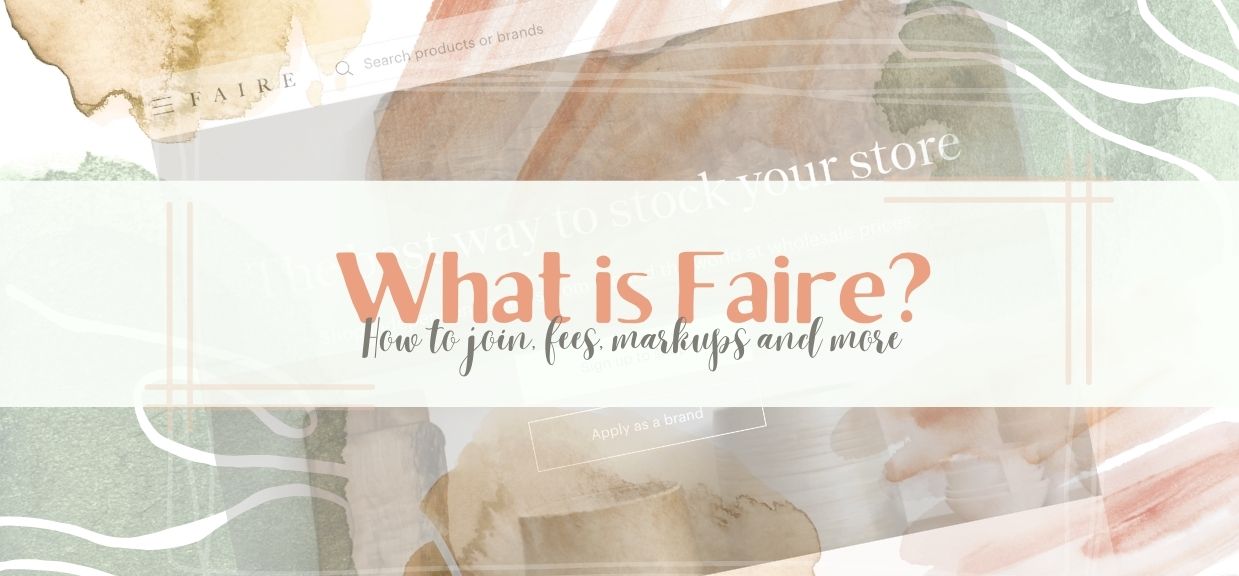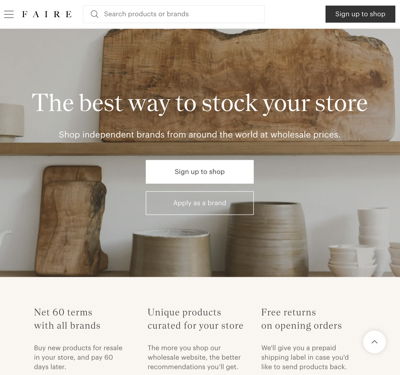What is Faire Wholesale? The Ultimate Guide
We discuss Faire Wholesale, the online handmade wholesale marketplace - how it works, what are the fees for selling on this platform and what markups you should use.

If you are a handmade craft seller looking to expand into wholesale, you may have heard about Faire.
If not, and you are keen to learn about this new online wholesale channel, keep reading - in this article, we will discuss how Faire works in detail.
Need to get your Faire inventory under control?
Try Craftybase - the inventory and manufacturing solution for Faire wholesale sellers. Track raw materials and product stock levels (in real time!), COGS, shop floor assignment and much more.
It's your new production central.
In this article we will cover:
- What is Faire?
- How much does it cost to sell on Faire?
- How does Faire work?
- Understanding Faire’s Commission Structure
- Faire Backorders
- Pricing on Faire
- How to price your products on Faire
- Using Software to Manage your Faire inventory
- Summary
What is Faire?
Faire (also called “Faire Wholesale” or “Faire Wholesale Marketplace”) is a wholesale marketplace that connects independent “brands” to independent boutiques. Faire was created in 2017 with a vision to help small businesses come together to compete on a more level playing field with the likes of Walmart and Amazon. Today, they have over 500,000 retailers and 70,000 brands.
It’s one of a couple of wholesale marketplaces that have been popping up over the last couple of years: some others in the same arena are Tundra, Bulletin and Abound. If you have previously dismissed Faire because you don’t see yourself as a “brand”, it’s time to take another look. Faire calls any independent shop a “brand” - if you make your own (that’s you, handmade seller!).

How much does it cost to sell on Faire?
If you are an independent handmade seller, you can sign up to Faire for free. You will only be charged a commission of 25% on orders from new customers who found your brand directly through the marketplace.
For repeat orders from the same customer, the commission is 15%. There is no charge for using Faire with your existing customers.
How does Faire work?
Faire is a wholesale marketplace that connects independent “brands” (sellers) to independent boutiques (buyers).
Faire has spent a lot of time and money in attracting wholesale retailers to the platform, including offering 60-day payment terms and free returns on opening orders to make it as “risk free” as possible. In a similar vein to Etsy, they have created a ready audience looking to purchase your products that you can take advantage of.
👉 Check out our free Faire commission and payout calculator →
As a brand, you can sign up for free and only be charged a commission on orders placed by new customers who found your brand through the marketplace. For repeat orders from the same customer, the commission is lower. You can also use Faire’s free tools to take orders from your existing customers and prospects. When you join Faire, your brand will go live in the marketplace and retailers will be able to discover your products and place orders. Faire also runs a number of popular online wholesale fairs which work like a virtual tradeshow (without the travel).
Understanding Faire’s Commission Structure
So how does it work? When a customer orders from you on Faire, they pay Faire first and then Faire pays you. This may sound like a risk, but Faire offers payment protection for all orders: if a customer doesn’t receive their order or is not happy with it, Faire will refund the customer and you will still get paid.
All orders are paid directly to your bank account in your local currency - you can select either next-day payment (which comes with an additional 3% fee) or the regular 30-day terms. You will be able to set your preferred payment method when you join Faire. Both options require you to provide a routing and account number for a U.S.-based bank (or Adyen account), so that funds can be transferred according to your payout terms.
Faire Backorders
Faire also features a backorder process: when a full order cannot be fulfilled (i.e. you don’t currently have enough stock on hand to send the entire ordered quantity), you have the option to place a portion of the order on Backorder status via the Faire interface.
This will split the order into two orders; the original will be updated to contain the quantity that will be fulfilled now, and a second order will be created containing the remainder to be fulfilled later.
Pricing on Faire
Now that we’ve gone over the basics of how Faire works, let’s talk about pricing. First of all, it’s important to note that you set your own prices on Faire. There is no minimum order size, so you can sell just one item if you want to. You can set two different prices for each of your products on Faire: one for retail and one for wholesale.
All sellers on Faire must follow the pricing policy: wholesale prices must be the same or lower on Faire as on other places you sell your products and retail prices must be the same or lower on Faire as on other places you sell your products. This is to ensure that retailers on Faire can always find the best prices.
If you sell in different currencies, your prices can be different however the same rule applies: they need to be less or the same than on your other sales channels in the same currency.
It’s important that Faire does check your pricing from time to time and will reach out to you if your prices are higher on Faire than elsewhere. You will, in this case, need to adjust your pricing - failing to do so can result in your products being suspended from the platform.
How to price your products on Faire
Now that you know how Faire works and what the fees are, you may be wondering how best to price your products.
As you will need to be pricing your products competitively for wholesale purchasers, it’s hugely important to ensure that you have a complete awareness of your margins.
This means calculating and knowing your base production cost and time to make for each of your products (this is also referred to as your COGS). This should include all materials required to make the product and an estimate of your internal labor to produce the item.
See also: Why you need to create a Bill of Materials (BOM) for your DTC products →
Some products, as much as you would like them to, will just not work in a wholesale situation - they may have small margins already, or be time consuming to make in bulk. It’s important to ensure that each one of the products you select to sell on Faire will make the margins you require.
From here, you’ll want to use your base cost to calculate a wholesale pricepoint. This should be a price that allows the retailer to be able to onsell your product to customers with a reasonable margin.
Retailers who sell in this manner usually use a margin of 50% or 2x the wholesale price. We recommend using a 50% markup on Faire, which is in line with the industry average. This will give you a good balance of profitability and competitiveness.
See also: How to set prices for your products →
Of course, you may want to experiment with different markups to see what works best for your business. And if you find that you are getting a lot of orders from Faire, you may want to consider increasing your prices to make more profit on each order: lots of orders (particularly repeat ones) indicates that customers are easy to find for your products. Retailers in this situation will be more receptive to lower margins if they are getting volume sales.
Using Software to Manage your Faire inventory
Managing your inventory on Faire can be smooth and effortless with the right software, and Craftybase is a solution worth considering. Craftybase is an inventory and bookkeeping system designed specifically for in-house DTC manufacturers that features an integration with Faire.
The software provides a streamlined experience, allowing you to keep track of your product quantities, costs, and sales across all sales channels including Faire. See Craftybase + Faire in action: Spade to Fork uses Craftybase to manage inventory across Faire, Shopify, and Amazon, with automatic sales syncing eliminating manual reconciliation across systems—critical for their expansion into brick-and-mortar retail. Similarly, Kasia from Rustic Maka—a 10-year Craftybase customer—manages her natural body care inventory across Faire, Shopify, Square, and Amazon, using components for product bundling and auto-manufacture to streamline her two-person operation.
Craftybase has a range of robust features including real-time inventory tracking, cost calculation, and profitability analysis based on your unique costs of production.
This allows you to confidently make informed decisions about your pricing and production strategies. Moreover, the software can easily integrate with other sales platforms, keeping all your sales data in one place for convenience and efficiency.
Why not see for yourself how Craftybase can take your Faire business to the next level?
We invite you to take advantage of our free trial and experience firsthand how seamlessly the software works in streamlining your inventory management. Start your free 14 day trial now!
Remember, an effective inventory management system is not an expense, it’s an investment in your business success!
Summary
In short, Faire is a great way to connect with new customers and get your products out there. And the best part is, it’s free to sign up!
So if you’re an independent seller looking to expand your reach, definitely give Faire a try.
Psst…still can’t decide which wholesale marketplace you should use? See our detailed comparison between Faire wholesale and Tundra →
Selling on Faire FAQ
Where I can sell on Faire from?
Faire is currently available in the following countries:
- United States
- Canada
- United Kingdom
- Austria
- Belgium
- Denmark
- Finland
- France
- Germany
- Ireland
- Italy
- Luxembourg
- Netherlands
- Norway
- Portugal
- Spain
- Sweden
- Switzerland
- Australia
Can I sell Faire products on Etsy?
Yes, if you have made the product yourself you can use both Etsy and Faire as platforms to sell your products. However, it’s important to note that Faire does not allow retailers to sell on Etsy. Reselling is only allowed in the vintage and craft supplies categories on Etsy. So, if your products fall under those categories, you can sell them on Etsy.
Can I sell Faire products on Amazon?
Faire does not allow retailers to sell their products on Amazon or other third-party marketplaces. Faire emphasizes that their products should not be resold on platforms like Amazon, eBay, Etsy, Poshmark, or others to maintain their exclusivity.
